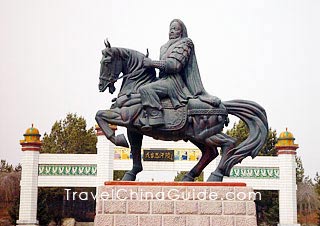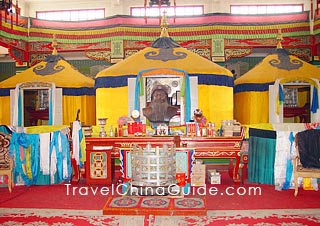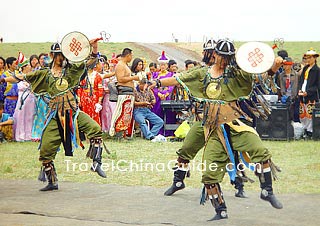Yuan Dynasty
 |
| Statue of Genghis Khan |
Since the late period of the 12th century, an ethnic minority group called Mongolian had grown up in the northern areas of China. In 1204, one of the leaders of the Mongolian tribes, Tiemuzhen, unified all the internal tribes. Two years later, Tiemuzhen was honored as Genghis Khan (meaning - the ruler of the world) and soon established the Mongolian Empire. Successively, it captured Xixia and the Jin Dynasty (1115 - 1234), after which the combative Mongolian army sent its military forces into Central Asia and Europe.
In 1260, the grandson of Tiemuzhen, Kublai Khan, ascended the throne. In 1271, he formally established the Yuan Dynasty with Yuandadu (currently Beijing) as the capital. (The new dynasty was not territorially the former Mongolian Empire as three parts had broken away before the new dynasty was founded.)
In 1276, not long after the founding of the dynasty, Kublai Khan led his army, capturing the capital of the Southern Song Dynasty (1127 - 1279) and thus he unified the entire China.
 |
| Genghis Khan's Mausoleum, Baotou, Inner Mongolia |
At that time, Yuan's territory stretched to Mongolia and Siberia in the north, the South Sea in the south, Yunnan Province and Tibet in the southwest, eastern part of Xinjiang Province in the northwest and the Stanovoi Range in the northeast. The total area of the country was over 4.6 million square miles.
As a mighty state, the Yuan Dynasty enjoyed economic development and prospered in the fields of science and literature. The economy was mainly based on agriculture. The agricultural techniques used were superior to those of previous dynasties and food output increased. Additionally, the use of paper currency stimulated the development of commerce. Meanwhile, trade with foreign countries was greatly encouraged following an open policy adopted by the rulers. In the area of science, astronomy, mathematics and medicine reached a very high level. In literature, the Yuan drama, along with the Tang poem and 'ci' poem of the Song Dynasty (960 - 1279), was considered another heritage of Chinese literature.
 |
| Nadam Fair on Gegentala Grassland, Hohhot, Inner Mongolia |
During the glorious period, diplomatic activities with foreign countries were quite frequent with many foreign envoys, merchants and travelers traversing the sea to come to China. Among them, the famous Italian merchant Marco Polo was a successful cultural transmitter who wrote the historic travel notes, The Travels of Marco Polo, informing the West about China.
In the late period, the internal contradictions of the ruling class, serious natural disasters, and unreasonable grading system together aroused the indignation of the people. In 1367, the rebel army led by Zhu Yuanzhang captured the Yuan capital, ending the ever mighty Yuan regime.
Emperors
| Order | Name | Notes | Period of Reign |
|---|---|---|---|
| 1 | Taizu (Borjigin Temujin) | Also known as Genghis Khan the great military leader; Temujin founded the great Mongolian Empire, with his territory stretching across the entire Eurasian Continent. | 1206 - 1227 |
| 2 | Ruizong (Borjigin Tolui) | The fourth son of Temujin, he governed the empire for two years after Temujin died | 1227 - 1229 |
| 3 | Taizong (Borjigin Ögedei) | The third son of Temujin; during his reign, he formed an alliance with the Southern Song to fight against Jin (1115 - 1234). | 1229 - 1241 |
| 4 | Empress Zhaoci (Töregene Khâtûn) | After the death of Taizong, a grandson of Temujin was due to succeed the throne, but the empress Zhaoci usurped the throne. | 1241 - 1246 |
| 5 | Dingzong (Borjigin Güyük) | The eldest son of Taizong | 1246 - 1248 |
| 6 | Empress Qinshu (Oghul Ghaymish) | Empress of Dingzong; she ruled for three years after the death of Dingzong . | 1248 - 1251 |
| 7 | Xianzong (Borjigin Möngke) | During his reign, the Yuan army began to fight against the Southern Song (1127 - 1279). In 1259, he died while on march. | 1251 - 1259 |
| Yuan Emperors | |||
| 8 | Yuan Shizu (Borjigin Kublai) | Grandson of Genghis Khan, and founder of the Yuan Dynasty. He moved the capital to Beijing and settled there. In 1279, he defeated the Southern Song (960 - 1279). | 1260 - 1294 |
| 9 | Yuan Chengzong (Borjigin Temür) | Grandson of Kublai Khan; a conventional emperor | 1295 - 1307 |
| 10 | Yuan Wuzong (Borjigin Qayshan) | Nephew of Chengzong | 1308 - 1311 |
| 11 | Yuan Renzong (Borjigin Ayurparibhadra) | Younger brother of Wuzong; he ascended the throne after Wuzong died | 1312 - 1320 |
| 12 | Yuan Yingzong (Borjigin Suddhipala) | Son of Renzong; he was killed by political enemies in a coup. | 1321 - 1323 |
| 13 | Taiding Di (Borjigin Yesün-Temür) | Grandson of Kublai Khan; an unremarkable emperor | 1324 - 1328 |
| 14 | Tianshun Di (Borjigin Arigaba) | The youngest son of Taiding Di; he was placed on the throne following a coup, but ruled for only a month. | 1328 |
| 15 | Yuan Wenzong (Borjigin Toq-Temür) | The second son of Wuzong; he died of illness in 1332. | 1328 - 1332 |
| 16 | Yuan Mingzong (Borjigin Qoshila) | The eldest son of Wuzhong; He was poisoned by Wenzong and reigned for only eight months. | 1329 |
| 17 | Yuan Ningzong (Borjigin Irinchibal) | The second son of Mingzong; after ruling for less than two months, he died of illness. | 1332 |
| 18 | Yuan Huizong (Borjigin Toghan-Temür) | The eldest son of Mingzong; during his reign, the Hongjinjun Uprising broke out and subsequently the capital was captured by Zhu Yuanzhang. | 1333 - 1368 |